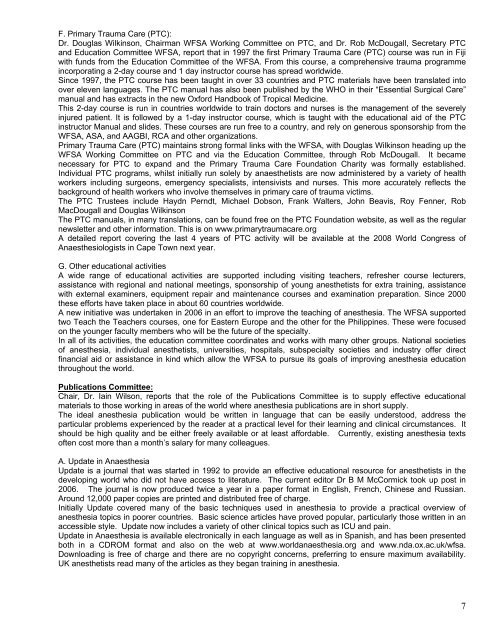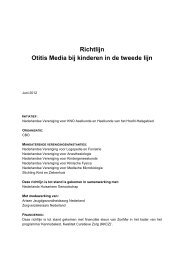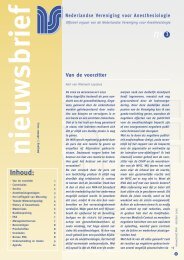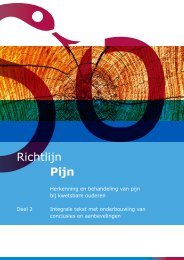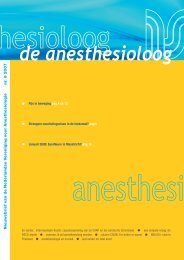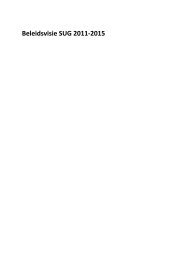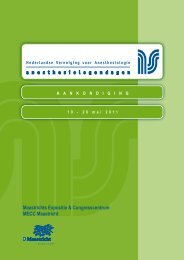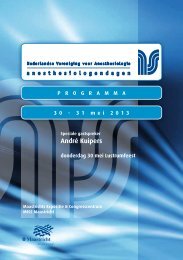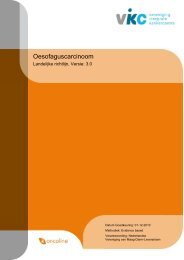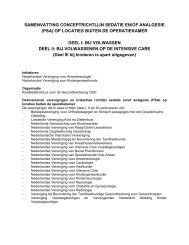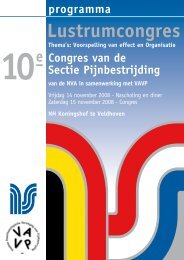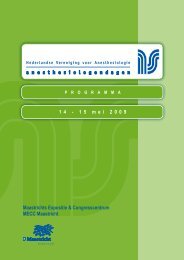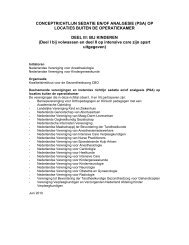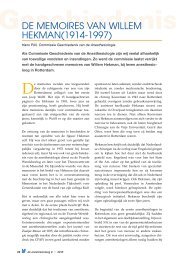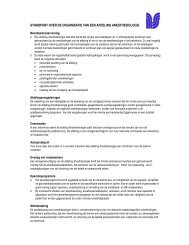world federation of societies of anaesthesiologists annual report 2006
world federation of societies of anaesthesiologists annual report 2006
world federation of societies of anaesthesiologists annual report 2006
- No tags were found...
You also want an ePaper? Increase the reach of your titles
YUMPU automatically turns print PDFs into web optimized ePapers that Google loves.
F. Primary Trauma Care (PTC):Dr. Douglas Wilkinson, Chairman WFSA Working Committee on PTC, and Dr. Rob McDougall, Secretary PTCand Education Committee WFSA, <strong>report</strong> that in 1997 the first Primary Trauma Care (PTC) course was run in Fijiwith funds from the Education Committee <strong>of</strong> the WFSA. From this course, a comprehensive trauma programmeincorporating a 2-day course and 1 day instructor course has spread <strong>world</strong>wide.Since 1997, the PTC course has been taught in over 33 countries and PTC materials have been translated intoover eleven languages. The PTC manual has also been published by the WHO in their “Essential Surgical Care”manual and has extracts in the new Oxford Handbook <strong>of</strong> Tropical Medicine.This 2-day course is run in countries <strong>world</strong>wide to train doctors and nurses is the management <strong>of</strong> the severelyinjured patient. It is followed by a 1-day instructor course, which is taught with the educational aid <strong>of</strong> the PTCinstructor Manual and slides. These courses are run free to a country, and rely on generous sponsorship from theWFSA, ASA, and AAGBI, RCA and other organizations.Primary Trauma Care (PTC) maintains strong formal links with the WFSA, with Douglas Wilkinson heading up theWFSA Working Committee on PTC and via the Education Committee, through Rob McDougall. It becamenecessary for PTC to expand and the Primary Trauma Care Foundation Charity was formally established.Individual PTC programs, whilst initially run solely by anaesthetists are now administered by a variety <strong>of</strong> healthworkers including surgeons, emergency specialists, intensivists and nurses. This more accurately reflects thebackground <strong>of</strong> health workers who involve themselves in primary care <strong>of</strong> trauma victims.The PTC Trustees include Haydn Perndt, Michael Dobson, Frank Walters, John Beavis, Roy Fenner, RobMacDougall and Douglas WilkinsonThe PTC manuals, in many translations, can be found free on the PTC Foundation website, as well as the regularnewsletter and other information. This is on www.primarytraumacare.orgA detailed <strong>report</strong> covering the last 4 years <strong>of</strong> PTC activity will be available at the 2008 World Congress <strong>of</strong>Anaesthesiologists in Cape Town next year.G. Other educational activitiesA wide range <strong>of</strong> educational activities are supported including visiting teachers, refresher course lecturers,assistance with regional and national meetings, sponsorship <strong>of</strong> young anesthetists for extra training, assistancewith external examiners, equipment repair and maintenance courses and examination preparation. Since 2000these efforts have taken place in about 60 countries <strong>world</strong>wide.A new initiative was undertaken in <strong>2006</strong> in an effort to improve the teaching <strong>of</strong> anesthesia. The WFSA supportedtwo Teach the Teachers courses, one for Eastern Europe and the other for the Philippines. These were focusedon the younger faculty members who will be the future <strong>of</strong> the specialty.In all <strong>of</strong> its activities, the education committee coordinates and works with many other groups. National <strong>societies</strong><strong>of</strong> anesthesia, individual anesthetists, universities, hospitals, subspecialty <strong>societies</strong> and industry <strong>of</strong>fer directfinancial aid or assistance in kind which allow the WFSA to pursue its goals <strong>of</strong> improving anesthesia educationthroughout the <strong>world</strong>.Publications Committee:Chair, Dr. Iain Wilson, <strong>report</strong>s that the role <strong>of</strong> the Publications Committee is to supply effective educationalmaterials to those working in areas <strong>of</strong> the <strong>world</strong> where anesthesia publications are in short supply.The ideal anesthesia publication would be written in language that can be easily understood, address theparticular problems experienced by the reader at a practical level for their learning and clinical circumstances. Itshould be high quality and be either freely available or at least affordable. Currently, existing anesthesia texts<strong>of</strong>ten cost more than a month’s salary for many colleagues.A. Update in AnaesthesiaUpdate is a journal that was started in 1992 to provide an effective educational resource for anesthetists in thedeveloping <strong>world</strong> who did not have access to literature. The current editor Dr B M McCormick took up post in<strong>2006</strong>. The journal is now produced twice a year in a paper format in English, French, Chinese and Russian.Around 12,000 paper copies are printed and distributed free <strong>of</strong> charge.Initially Update covered many <strong>of</strong> the basic techniques used in anesthesia to provide a practical overview <strong>of</strong>anesthesia topics in poorer countries. Basic science articles have proved popular, particularly those written in anaccessible style. Update now includes a variety <strong>of</strong> other clinical topics such as ICU and pain.Update in Anaesthesia is available electronically in each language as well as in Spanish, and has been presentedboth in a CDROM format and also on the web at www.<strong>world</strong>anaesthesia.org and www.nda.ox.ac.uk/wfsa.Downloading is free <strong>of</strong> charge and there are no copyright concerns, preferring to ensure maximum availability.UK anesthetists read many <strong>of</strong> the articles as they began training in anesthesia.7


